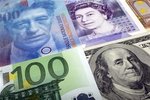EmpireGlobalfx
Active member
- Messages
- 212
- Likes
- 0
Brent crude rises above $118 on Europe debt deal
Brent crude oil jumped above $118 on Friday, supported by Europe's latest agreement to bail out Greece, but U.S. crude made only slight gains due to concern about talks to avert an unprecedented U.S. default
The Brent futures contract for September rose 91 cents at $118.42 a barrel by 11:17 a.m. EDT. U.S. crude rose 25 cents at $99.38 a barrel, after earlier trading as low as $98.43.
Analysts and traders said the preliminary solution to the euro zone debt crisis presented in Brussels on Thursday was still providing some support for Brent, but ongoing wrangling over the U.S. debt ceiling was impinging on U.S. crude.
"The U.S. debt ceiling crisis hasn't been solved and there has been mixed economic data, so that might not be enough to keep crude above $100, even though we are up at the moment," said Gene McGillian, analyst at Tradition Energy in Stamford, Connecticut.
In the United States, efforts are continuing to secure a last-minute deficit-reduction deal before the August 2 deadline to raise the country's debt ceiling.
Data showing that Chinese manufacturing contracted in July also has made some analysts and traders cautious. Commodity markets are focused on the economy of China as a major source of future demand growth.
Brent crude oil jumped above $118 on Friday, supported by Europe's latest agreement to bail out Greece, but U.S. crude made only slight gains due to concern about talks to avert an unprecedented U.S. default
The Brent futures contract for September rose 91 cents at $118.42 a barrel by 11:17 a.m. EDT. U.S. crude rose 25 cents at $99.38 a barrel, after earlier trading as low as $98.43.
Analysts and traders said the preliminary solution to the euro zone debt crisis presented in Brussels on Thursday was still providing some support for Brent, but ongoing wrangling over the U.S. debt ceiling was impinging on U.S. crude.
"The U.S. debt ceiling crisis hasn't been solved and there has been mixed economic data, so that might not be enough to keep crude above $100, even though we are up at the moment," said Gene McGillian, analyst at Tradition Energy in Stamford, Connecticut.
In the United States, efforts are continuing to secure a last-minute deficit-reduction deal before the August 2 deadline to raise the country's debt ceiling.
Data showing that Chinese manufacturing contracted in July also has made some analysts and traders cautious. Commodity markets are focused on the economy of China as a major source of future demand growth.



